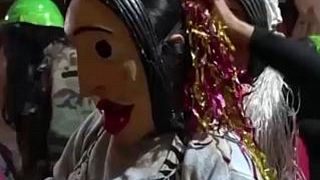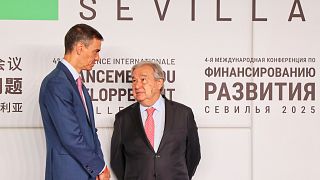Vatican
As a three week meeting at the Vatican on the future of the Catholic Church wraps up, a group of nuns spoke to journalists about their work in the church, the importance of their roles, and their frustrations at the limitations.
While they all felt they exert some power in their current roles, they expressed hope that the Synod of Bishops and Pope Francis could bring change to the Vatican hierarchy.
They were eagerly looking forward to hearing the results of the talks.
The Synod meeting will come to a close at the end of this week and the Vatican will be releasing the concluding document.
Many are wondering what will be decided on hot button issues like women in governance and the role of LGBTQ+ Catholics.
Sister Mary John Kudiyiruppil, executive vice secretary of the International Union of Superiors General, said she has heard positive news from the five sisters from her organisation who are participating in the discussions.
“I see it is getting better. But there have been really moments of frustration where we feel that it is by and large really led by the male hierarchy,” she explained.
She added that her organisation is a part of the Catholic Church so has to work for change from within.
There are 365 voting members including the pope participating in the Synod, 54 of whom are women.
For the first time, women and laypeople can vote on specific proposals alongside bishops, a radical change that is evidence of Francis’ belief that the church is more about its flock than its shepherds.
The Synod is the culmination of an unprecedented two-year canvasing of rank-and-file Catholics about their hopes for the future of the institution.
Women have long complained they are treated as second-class citizens in the church, barred from the priesthood and highest ranks of power yet responsible for the lion’s share of church work — teaching in Catholic schools, running Catholic hospitals and passing the faith down to next generations.
Sister Jean Quinn said that in her role as Executive Director of UNANIMA, a non -profit working in New York City, she works closely with UN member states, often sitting at the table with UN Ambassadors.
She did not think that women need to be ordained to have power in the church.
Sister Maamalifar Poreku said that she began her work as a sister serving in an area where there were no priests.
“At the beginning of my own training, I was sent to a country, to a place where we had no priests, it was us (women) who were organising the celebration for the people in their parish,” Poreku said.
“The people did not know the difference between a priest and a sister. They didn’t miss our priests, so that is why I say we have power.”
Women have long demanded a greater say in church governance, at the very least with voting rights at the periodic synods at the Vatican but also the right to preach at Mass and be ordained as priests.
While they have secured some high-profile positions in the Vatican and local churches around the globe, the male hierarchy still runs the show.
The potential that this synod, and a second session next year, could lead to real change on previously taboo topics has given hope to many women and progressive Catholics.













02:17
Uma Thurman returns to her action roots in The Old Guard 2 opposite Charlize Theron
01:32
Catholic Pope affirms priest celibacy, demands 'firm' action on abuse
01:55
DR Congo: Joy in Goma as local man beatified by Pope Leo XIV
00:08
Vatican beatifies Congolese customs worker killed in 2007 for refusing bribe
Go to video
Boko Haram kidnaps Nigerian Priest near Cameroon border
01:52
Catholic Church urged to help more as education costs in Africa rise